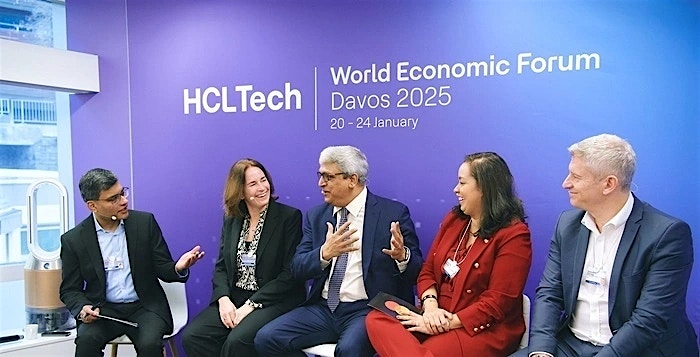The financial services sector is undergoing a profound transformation, shaped by rapid technological advancements, ecosystem partnerships, disruptive competition and an evolving regulatory landscape. Against this backdrop, HCLTech hosted a panel at the World Economic Forum in Davos featuring leaders from MasterCard, Nasdaq and Euroclear.
These industry experts shared their insights on the challenges and opportunities driving the future of financial services. From the growing significance of small-scale innovation to the need for global harmonization in cross-border payments, the panel explored key trends reshaping the sector.
Impact-driven growth: Small is the new big
At the heart of the discussion, Srinivasan Seshadri, Chief Growth Officer and Global Head, Financial Services at HCLTech, highlighted a shift in perspective: prioritizing impact over sheer scale. "We’re all chasing scale — bigger is often seen as better," he noted. "But small can be the new big when it comes to creating impact with limited resources."
Seshadri elaborated on the potential of financial institutions to adapt by fostering smaller, agile teams within larger organizations. "If we can ensure smaller groups within a larger framework, we can create powerful impacts across the bank." He also underscored FinTech’s transformative role in enhancing user experiences and the potential of AI to redefine business processes, emphasizing adaptability as a cornerstone of future success.
Data: The foundation of financial innovation
A recurring theme throughout the panel discussion was the importance of data, with Bannert-Thurner emphasizing its ecosystem-wide benefits. "We leverage data across the entire ecosystem, applying insights to benefit everyone," she explained.
However, the panelists acknowledged the inherent challenges of data sharing and emphasized the importance of robust governance and trust. Srinivasan pointed out the need for a shift in how financial institutions approach data, stating, "Data is common in infrastructure, but how we use it to create better insights or customer experiences is far more important." Governance and trust were highlighted as critical to the effective use of data. He also stressed upon the need to balance the need for data sovereignty without compromising on innovation.
Bello agreed, stressing the importance of governance frameworks that prioritize consumer data protection. She stated: "It's crucial that governance frameworks ensure consumers understand their data belongs to them, and our job is to make sure it’s safe, secure, and protected."
Danloy then introduced the idea of a centralized data-sharing hub managed by trusted financial market infrastructures. "We can help FinTechs develop their capabilities by providing one single data hub they can access, rather than requiring connections with multiple organizations." Such a hub could simplify data access for Fintechs while maintaining strict governance and security protocols.
The power of ecosystem and partnerships
The significance of ecosystems and partnerships in driving innovation and addressing the challenges faced by the financial sector was also discussed.
Steffany Bello, Senior Vice-President, Digital Partnerships, Fintech and Enablers in North America at Mastercard, highlighted the importance of partnerships, saying, "Partnerships are essential. We partner with around 80% of the main players in the ecosystem." She described MasterCard’s efforts to engage with FinTech startups through Start Path, its startup engagement program, which has supported over 400 FinTechs across 54 countries. "We accompany them through their journey, invest in them and provide mentors. We've had this program for around 10 years," she added.
Sebastien Danloy, Chief Business Officer at Euroclear emphasized the need to support FinTechs with effective go-to-market strategies. "Many FinTech companies have brilliant ideas but lack strong go-to-market plans. That's where we can help. With our connectivity to clients, we support them as they launch their products," he explained.
Valerie Bannert-Thurner, Chief Revenue Officer, Financial Technology at Nasdaq, echoed these sentiments, underscoring the value of partnerships in enhancing productivity and competition. "There's a lot of value to be created by better connecting global markets, enabling more efficient and broader transfers while widening the pool of liquidity," she said.
Srinivasan also stressed the importance of collaboration within the financial services ecosystem, stating: "Collaboration is key. As service providers, we help integrate many initiatives discussed here, ensuring better service delivery to customers. If we all embrace collaboration, the results will only get better."
He reiterated the role of smaller, adaptable groups within the larger ecosystem. "If we can ensure smaller groups within which collaboration happens, powerful impacts can be created across financial services,"
Cross-border payments: A call for global harmonization
The inefficiencies in cross-border payments emerged as a critical pain point, with panelists discussing the complexities of interoperability. "Many players have developed their own infrastructure, which isn’t connected to the outside world," said Danloy.
He called for financial market infrastructures to facilitate interoperability and harmonized regulations globally. "Consistency and harmonization in global regulations are crucial for companies operating in diverse markets," he said.
Cryptocurrency and digital assets: From niche to mainstream
The panel also examined the evolving role of cryptocurrency and digital assets. Bello outlined MasterCard’s involvement in the space, including the use of stablecoins. Bannert-Thurner predicted: "Digital assets will become more mainstream — not just as cryptocurrencies but as part of the digital economy, used for collateral, margining and institutional purposes."
Danloy suggested that central bank digital currencies (CBDCs) will be a key area for exploration, with financial market infrastructures playing a pivotal role in testing and implementing these innovations.
A balanced future
Ultimately, the key to success in the evolving financial services landscape will be the ability to strike a balance between embracing data and technological advancements, fostering collaborative partnerships and navigating the regulatory landscape. By adopting a forward-thinking, adaptable and customer-centric approach, financial institutions can position themselves to thrive in the data economy, delivering enhanced services and experiences that meet the evolving needs of the modern financial ecosystem.
"Maybe it’s time to rethink growth — not in absolute numbers but in terms of the impact we create with the least resources," added Srinivasan.






